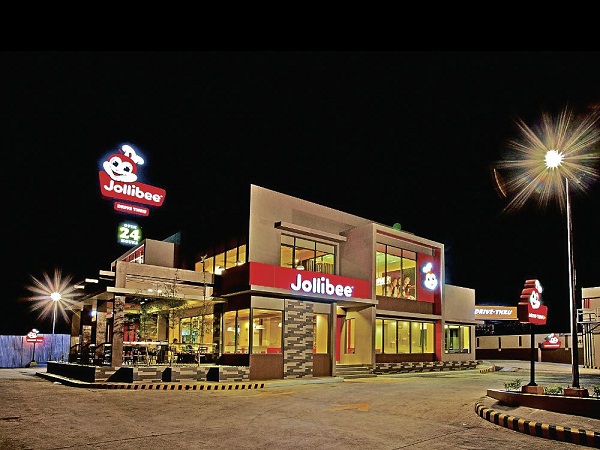
Jollibee branch in Pasig City
It’s not enough to make up for regular dine-in business foregone from the lockdown of Luzon and other parts of the country for a month and a half, but the country’s food retailers have taken this COVID-19 crisis as an opportunity to grow their food delivery operations.
Fast-food giant Jollibee Foods Corp.’s delivery business in stores that remained open during the quarantine period is growing by an average of 50 percent versus same-store sales in the early part of 2020, Jollibee disclosed to the Philippine Stock Exchange.
In early 2020, before the COVID-19 pandemic reached local shores, local delivery business accounted for 5 percent of system-wide sales, up from 3 percent in the previous year.
Delivery platform CocoDelivery, a unit of newly listed kiosk operator Fruitas Holdings Inc., increased its business by 20 times since the government’s lockdown order on Luzon, Fruitas founder, president and chief executive Lester Yu said.
At the beginning of the monthlong lockdown, Yu said Cocodelivery had been overwhelmed by the surge in volume given manpower constraints but the unit was able to adjust and cope by redeploying employees from other departments and business units.
The products available on this platform are 100-percent fresh buko juice, Jamaican Pattie, Tea Rex milk tea, and selected Soy & Bean products like soy milk, taho and tofu. Fruitas has also rolled out a delivery service covering Metro Cebu.
Amid the Luzon-wide lockdown, Max’s Group Inc. (MGI) suspended all restaurant operations for 10 days as a precautionary measure but resumed operations in selected locations effective April 5, citing “authentic market demand.”
As of last week, MGI reopened 47 branches of the following brands combined: Max’s Restaurant, Yellow Cab, Pancake House, Teriyaki Boy, Sizzlin’ Steak, Dencios, Maple and Kabisera.
Despite closing majority of its stores during the lockdown, Shakey’s Pizza Asia Ventures kept select Shakey’s and Peri-Peri Charcoal chicken outlets operational for delivery and carry-out services albeit on a limited menu and shorter operating hours, running on a reduced and voluntary workforce. It is looking to gradually re-open more select outlets over the next few weeks.
“This is an extraordinary time, but we are able to manage through by prioritizing a strong cash and liquidity position, and slowly increasing delivery and carry-out accessibility,” Shakey’s president and CEO Vicente Gregorio said.
Gregorio added: “Amidst the short-term disruptions, we are also readying ourselves to bounce back in what we believe will be a new ‘post COVID’ world where a strong brand and delivery presence is key. Though the full effects of COVID remain unknown, we are firmly in this business for the long run benefit of all our stakeholders, including our employees and our guests, and we believe that the structural growth story of dining out in the Philippines is still intact.”
Jollibee also reported that its business in mainland China was now recovering. At the height of the COVID-19 breakout China in February, 107 of its 342 stores or 31 percent of its network in China were padlocked. But even during that time, the delivery business continued to operate. The delivery business – which accounted for 40 percent of sales of JFC’s biggest brand in China, Yonghe King – now accounted for 76 percent of its sales as of end-March and was growing by 20 percent versus same period a year ago.
The number of padlocked stores in China had declined to 22, representing 6 percent of Yonghe King’s total store network. One innovation that has contributed meaningfully in China is the “contactless take-out,” where the customer sends and pays for its order by mobile phone application to a particular store and picks up the order outside the store at a specified time, without having direct interaction with the store crew, thus keeping social distancing even with a take-out purchase.
In the North America, Smashburger suspended its dine-in services, but continued serving its customers through on-line delivery and take-out business. Philippine brands Jollibee, Chowking and Red Ribbon also continued to operate with drive-thru and take-out options.
In Singapore, Jollibee’s delivery business grew by 256 percent during the crisis period versus year ago, increasing its sales contribution from 7 percent to 22 percent, and enabling total same store sales to grow by about 4 percent.
Jollibee chief executive officer Ernesto Tanmantiong said: “While the COVID-19 pandemic has brought unprecedented disruption to our operations in the Philippines and other parts of the world, we are already planning for the full restoration of our operations. We expect growth to resume even if gradually, driven by our delivery, take-out and drive thru business channels.”
Jollibee deferred about P9 billion worth of capital expenditures from 2020 to 2021, citing operational constraints to the construction of facilities and to the uncertain demand volume due to limited mobility of consumers. Capital spending for 2020 was thus slashed by 64 percent to P5 billion. INQ